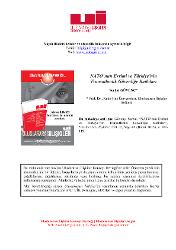| dc.contributor.author | Güvenç, Serhat | |
| dc.date.accessioned | 2020-09-21T12:01:31Z | en_US |
| dc.date.available | 2020-09-21T12:01:31Z | en_US |
| dc.date.issued | 2015 | en_US |
| dc.identifier.issn | 1304-7310 | en_US |
| dc.identifier.uri | https://hdl.handle.net/20.500.12469/3411 | |
| dc.identifier.uri | https://dergipark.org.tr/tr/pub/uidergisi/issue/39290/462674 | |
| dc.identifier.uri | https://search.trdizin.gov.tr/yayin/detay/176865 | |
| dc.description.abstract | Türkiye NATO’ya 60 yıl aşkın bir süredir üyedir. Bu sürede güvenliğin hedefleri ve araçlarındaki değişime koşut
olarak Türkiye’nin NATO’nun kolektif güvenlik sistemine katkısı da nitelik ve nicelik olarak değişim göstermiştir.
Türkiye’nin katkıları bağlamında süreklilik gösteren iki unsur göze çarpmaktadır. Bunlardan birisi coğrafi
konumudur. NATO’nun tehdit algılarının yoğunlaştığı bölgelere komşuluğu Türkiye ittifak açısından emlak
değerini artırmaktadır. Bir diğer konu ise Türkiye’nin diğer müttefiklere oranla mukayeseli üstünlüğü sayılan, düşük
maliyetle büyük bir orduyu silahaltında tutabilmesidir. Soğuk Savaş’ta Türkiye’nin ittifaka katkıları bu iki eksende
değerlendirilmiştir. Soğuk Savaş sonrası dönemde, alan dışı kolektif güvenlik görevlerine talip olan NATO’nun
evrilen gereksinimleri doğrultusunda Türkiye de katkısını dönüştürüp nicelikten niteliğe ağrılık verdi. Ancak
NATO’nun Balistik Füze Savunma Sistemi örneğinde olduğu gibi yünümüzde Türkiye’nin ittifaka temel katkısı bir
kez daha coğrafi konumunun bir fonksiyonu olarak gündeme gelmiştir. | en_US |
| dc.description.abstract | Turkey has been member of NATO for more than six decades. Turkey’s contributions to NATO’s collective
defense have evolved in quantity and quality in step with changes in the ends and means of security. In terms of its
contributions to the alliance, two elements of continued stand out. The first one is Turkey’s location. Its proximity
to zones of risks and threats in NATO’s assessments has turned Turkey into an asset. The other element is Turkey’s
ability to raise and maintain a large army at a relatively low cost. This has been considered Turkey’s “competitive
edge” in NATO. Its real estate value and its large army constituted the two main pillars of Turkey’s contribution
to NATO during the Cold War. Turkey has shifted its emphasis away from quantity to quality to meet NATO’s
evolving requirements for post-Cold War out-of-area collective security missions. Nevetheless, Turkey’s real estate
value has come a full circle for the alliance with Ankara’s decision to host an radar site as part of NATO’s AntiBallistic Missile Defense System. | en_US |
| dc.language.iso | eng | en_US |
| dc.publisher | Uluslararası İlişkiler Konseyi Derneği İktisadi İşletmesi | en_US |
| dc.rights | info:eu-repo/semantics/openAccess | en_US |
| dc.subject | NATO | en_US |
| dc.subject | Transatlantik Güvenlik | en_US |
| dc.subject | Kolektif Savunma | en_US |
| dc.subject | Yük Paylaşımı | en_US |
| dc.subject | Türkiye’nin Savunması | en_US |
| dc.subject | Transatlantic Security | en_US |
| dc.subject | Collective Defense | en_US |
| dc.subject | Burden Sharing | en_US |
| dc.subject | Turkish Defense | en_US |
| dc.title | NATO'nun Evrimi ve Türkiye'nin Transatlantik Güvenliğe Katkıları | en_US |
| dc.type | other | en_US |
| dc.identifier.startpage | 101 | en_US |
| dc.identifier.endpage | 119 | en_US |
| dc.relation.journal | Uluslararası İlişkiler | en_US |
| dc.identifier.issue | 45 | en_US |
| dc.identifier.volume | 12 | en_US |
| dc.department | Fakülteler, İktisadi, İdari ve Sosyal Bilimler Fakültesi, Uluslararası İlişkiler Bölümü | en_US |
| dc.institutionauthor | Güvenç, Serhat | en_US |
| dc.relation.publicationcategory | Diğer | en_US |
| dc.identifier.trdizinid | 176865 | en_US |
















